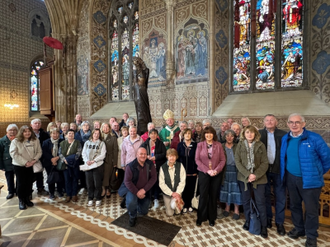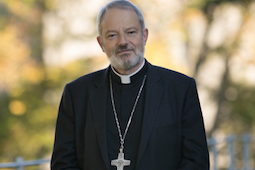Archbishop Martin prays for the 'unfinished work' of peace in the world on St Oliver Plunkett's anniversary

Archbishop Martin welcomes group from Co Meath, for the special Mass in St Patrick's Cathedral, Armagh. Image: CCO archive
Source: Irish Catholic Media Office
Archbishop Eamon Martin celebrated Mass today to mark the 400th anniversary of the birth of Saint Oliver Plunkett, and fifty years since the canonisation of the martyred saint, in 1975, by Pope Paul VI. During today's homily Archbishop Martin said: "I am praying these days through the intercession of Saint Oliver Plunkett"
- for success of the Middle East's fragile peace agreement, that hostages can be released and Gazans can return home safely;
- in these troubled times of war and violence, as opinions become polarised, the world seems to prefer putting up walls to building bridges and peace;
- for harmony and peace to Ireland, to address the painful legacy of conflict, and the 'unfinished work of peace' to build meaningful reconciliation.
Homily of Archbishop Martin
The year that Saint Oliver Plunkett was canonised, 1975, was also a jubilee year of Hope! It was the first holy year following the Second Vatican Council, and Pope Paul VI chose the theme 'Reconciliation and Renewal in Hope' - so similar to this year's theme chosen by Pope Francis: 'Pilgrims of Hope'.
Like his predecessor, Pope John XXIII, who wrote the powerful Encyclical, Peace on Earth, (Pacem in Terris, April 1963) - and who opened the Council this very weekend in 1963 - Pope Paul VI emphasised that the Church is a 'servant and partner' in building peace. In October 1965, Pope Paul VI became the first ever pope to travel to America; his aim was to make a strong appeal at the United Nations, in New York, for world peace and reconciliation. This was only twenty years since the end of the Second World War, and the Pope's words have gone down in history: "never again war, never again war! It is peace, peace, that has to guide the destiny of the nations".
So, on this day, fifty years ago, when he canonised Saint Oliver Plunkett, Pope Paul VI offered Oliver to the world as a model of peace and reconciliation.
As soon as Oliver came to Ireland, as Archbishop in 1670, he quickly got a reputation for being a mediator and a peace maker. Wherever he went, he was determined to settle disputes and divisions and tried to bring order and harmony. He built positive relationships with the Protestant Archbishop and clergy and one of his major achievements was to broker a peace agreement between the notorious 'Raparees' and the authorities of his time.
But, within four years, the political tide was turning against the practice of Catholicism; this didn't stop Archbishop Oliver. Despite growing opposition and threats to his health and life, he remained completely committed to his episcopal ministry. By 1678 he was a fugitive, with so many people hunting for him that he was certain he would be captured. In one of his letters at that time he wrote, 'whatever the danger, I will stay with my flock. I will not abandon them.'
Eventually, however, Oliver was arrested, and imprisoned on account of malicious charges against him. He was unjustly condemned to death, and after being dragged through the crowded streets of London, Oliver was publicly executed in a gruesome manner at Tyburn Cross. But even at the gallows, he never lost his hope in the Risen Lord. As Saint Paul wrote to Timothy in today's second reading, they can chain me 'like a criminal - but they cannot chain up God's news.'
Records show that Oliver died asking forgiveness for his own faults, and publicly forgiving all those who had plotted to take away his life.
No wonder then, at Oliver's canonisation in 1975, Pope Paul VI described him as a man of pardon and peace 'who chose to die rather than betray the faith or his people.' He added, 'Saint Oliver, was an "advocate of justice" and a "friend of the oppressed". He would not compromise with truth or condone violence: he would not substitute another gospel for the Gospel of peace. … O what a model of reconciliation: a sure guide for our day!'
Friends, fifty years later, we need Saint Oliver Plunkett more than ever to inspire us in these troubled times of war and violence; when opinions are becoming more and more polarised; and the world seems to prefer putting up walls and barriers to building bridges of trust and peace.
For Christians, peace-making and reconciliation begins in the heart, in recognising our own prejudices and faults, accepting our personal need for conversion before insisting that others should change their ways.
Or, as Pope Leo put it in a social media post just yesterday, 'Peace is unarmed and disarming. It is not deterrence, but fraternity; it is not an ultimatum, but dialogue. Peace will not come as the result of victories over the enemy, but as the fruit of sowing justice and courageous forgiveness.'
I am praying these days through the intercession of Saint Oliver for the success of the fragile peace agreement in the Middle East: that the hostages can be released back to their families, the people of Gaza can return to their towns and villages to begin the long process of rebuilding their homes and livelihoods; that a flood of humanitarian aid and international effort can allowed to pour into the shell of Gaza to renew hope and dispel despair. Father Romanelli, at the Holy Family Catholic Parish in Gaza, has asked the world to pray in thanksgiving and hope this weekend for a lasting peace.
Today, I am also asking Saint Oliver Plunkett to bring increased harmony and peace to Ireland. We still have much to do to address the painful legacy of our conflict. The 'unfinished work of peace' is to build meaningful reconciliation in our communities, and that is a long and difficult journey. But in Saint Oliver's name, we cannot allow ourselves to be 'robbed of hope'.
I like to think that Saint Oliver has always been blessing our peace efforts. The late Cardinal Tomás Ó Fiaich used to recall that the Irish War of Independence ended on the feast of Blessed Oliver in 1921. And it Is also true that, after the Good Friday Agreement, the first meeting of the Northern Ireland Assembly took place on Saint Oliver's feast, 1 July 1998. In 1979, when Pope John Paul II came to Ireland, he visited and prayed at the relics of Saint Oliver in Drogheda, and was inspired afterwards to make a powerful appeal for an end to violence in our land. He recalled that just a few years earlier as Archbishop of Krakow, he had attended the canonisation of Saint Oliver on 12 October 1975.
Today's Gospel reading is all about witness and gratitude to God. We have so much to be grateful to God for in the life and courageous witness of Saint Oliver Plunkett. We have every reason to trust and pray through the intercession of Saint Oliver, that we can be a Church that is alive in hope, courageous in faith and steadfast in its commitment to peace and reconciliation. In that way we truly mark a jubilee of hope and help bring our world closer to fulfilling the wish of Pope Saint Paul VI, 'never again war, never again war!'
Saint Oliver,
By your intercession and example
may all hatred and bitterness
be banished from the hearts of Irish men and women.
May the peace of Christ reign in our hearts,
as it did in your heart,
Even at the moment of your death.
Pray for us and for Ireland. Amen.


















